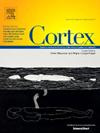双语轻度认知障碍患者语言转换与执行控制的分离
IF 3.2
2区 心理学
Q1 BEHAVIORAL SCIENCES
引用次数: 0
摘要
双语语言控制是一种动态的认知系统,使个体能够有效地管理语言使用,防止语言切换时的干扰。研究表明,某些神经退行性疾病可能会影响语言转换能力或阻碍跨语言干扰的抑制。然而,在双语命名条件下,主要影响中颞结构的神经退行性变(如轻度认知障碍(MCI))是否会影响词汇检索尚不确定。为了研究这一点,我们在语言转换任务中评估了早期和高度熟练的加泰罗尼亚-西班牙语双语者(n = 28)和年龄匹配的无MCI老年人(n = 40)。此外,为了探索语言控制缺陷的领域特异性,被试完成了4个执行控制任务:任务切换、n-back、空间Stroop和侧卫任务。结果表明,与老年人相比,MCI患者表现出更大的转换成本(转换减去重复试验),同时表现出相似的混合成本(重复减去单次试验)。在非语言控制域,MCI患者仅在n-back任务中表现明显差于老年人,在任务转换任务中表现较慢。然而,将非语言任务的表现作为语言转换表现的预测因子的回归分析模型并没有产生统计上显著的结果。这些发现表明,反应性控制(包括自下而上的、短暂的和刺激驱动的过程)可能独立于主动控制(定义为自上而下的和持续的控制过程)。尽管如此,语言控制缺陷的存在并不一定与EC缺陷有关,这表明这两个控制领域可能并不完全重叠。本文章由计算机程序翻译,如有差异,请以英文原文为准。
Dissociating language switching from executive control in bilinguals with MCI
Bilingual language control is a dynamic cognitive system that enables individuals to effectively manage language use and prevent interference when switching between languages. Research indicates that certain neurodegenerative conditions may influence language-switching abilities or hinder the suppression of cross-language interference. However, it remains uncertain whether neurodegeneration primarily affecting mesial temporal structures, such as Mild Cognitive Impairment (MCI), impacts lexical retrieval in dual-language naming conditions.
To investigate this, we assessed early and highly proficient Catalan-Spanish bilinguals with MCI (n = 28) and age-matched older adults without MCI (n = 40) in a language-switching task. Additionally, to explore the domain specificity of language control deficits, participants completed four executive control (EC) tasks: task switching, n-back, Spatial Stroop, and flanker task.
Results indicated that MCI patients exhibited larger switch costs (switch minus repeat trials) compared to older adults while showing similar mixing costs (repeat minus single trials). In the non-linguistic control domain, MCI patients performed significantly worse than older adults only in the n-back task and displayed slower performance in the task-switching task. However, the regression analysis model incorporating the performance of non-linguistic tasks as predictors of language switching performance did not yield statistically significant results.
These findings suggest that reactive control, which involves bottom-up, transient, and stimulus-driven processes, might be independently affected from proactive control, defined as a top-down and sustained control process. Nonetheless, the presence of language control deficits is not necessarily linked to deficits in EC, indicating that these two control domains may not entirely overlap.
求助全文
通过发布文献求助,成功后即可免费获取论文全文。
去求助
来源期刊

Cortex
医学-行为科学
CiteScore
7.00
自引率
5.60%
发文量
250
审稿时长
74 days
期刊介绍:
CORTEX is an international journal devoted to the study of cognition and of the relationship between the nervous system and mental processes, particularly as these are reflected in the behaviour of patients with acquired brain lesions, normal volunteers, children with typical and atypical development, and in the activation of brain regions and systems as recorded by functional neuroimaging techniques. It was founded in 1964 by Ennio De Renzi.
 求助内容:
求助内容: 应助结果提醒方式:
应助结果提醒方式:


